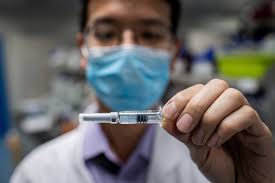When Will You Get The Covid-19 Vaccine? The Full Priority List
- Health SectorNewsboard
- No Comment
- 308

Health and care workers and the over-80s are among the first in line for the newly-approved Pfizer/BioNTech Covid-19 vaccine after the UK’s immunisation watchdog unveiled its priority list.
With rollout in the NHS due to start as early as next week, the independent Joint Committee on Vaccination and Immunisation (JCVI) announced the long-awaited list on Wednesday.
Age and occupation are the key factors aimed at the fastest delivery and better uptake among those at most risk of the virus.
The UK has already ordered 40m doses of the free jab – enough to vaccinate 20m people, or a third of the population.
The JCVI says its ranking of priorities is a “combination of clinical risk stratification and an age-based approach, which should optimise both targeting and deliverability”.
Here is its new priority list:
- Older adults resident in a care home and care home workers
- All those 80 years of age and over. Front line health and social care workers
- All those 75 years of age and over
- All those 70 years of age and over
- All those 65 years of age and over
- All Individuals aged 16 to 64 with underlying health conditions.
- All those 60 years of age and over
- All those 55 years of age and over
- All those 50 years of age and over
- The rest of the population (priority to be determined)
One key change to a previous provisional priority list is that 16- to 18-year-olds with underlying conditions have been added to adults at number 6 on the list.
The amendment may reflect evidence of the prevalence of the virus among older teenagers.
A previous priority covering those under 65 at “moderate risk” of the virus has also been ditched.
Younger people under 50 without underlying conditions are unlikely to get the vaccine until after the spring of 2021.
The “second phase” of the programme could also include specific occupations at most risk, the watchdog said. Among those under 50, teachers, bus drivers, taxi drivers, the military, civil servants and emergency services could then get the jab as a priority.
Professor Wei Shen Lim, chair of the JCVI, said he hoped that the first phase of the programme would cover the “90 to 99% of people who are at risk of dying from Covid-19”.
“Residents in care homes for older adults and care home workers are the highest priority, following that are those 80 years of age and above alongside frontline health and social care workers,” he said.
He also stressed that the rollout would not match the government’s tiered regions for Covid restrictions. It will be delivered not according to area, but according to national clinical priorities.
People from Black, Asian and minority ethnic (BAME) backgrounds are not mentioned in the priority list – despite the health secretary saying they could be among “the first” way back in June.
The JCVI said only that in the first stage of the programme its rollout would be guided by the need to “mitigate health inequalities, as might occur in relation to access to healthcare, deprivation, ethnicity” and to “promote good vaccine uptake”.
Prof Lim said that the “phase two” of the rollout was still undecided.
“I’d like to stress that we are so far advising how the vaccine might be used in the first phase of the programme,” he said.
“We haven’t yet decided how the vaccine might be used in subsequent phases…and we will be monitoring all the new emerging data including data coming up from phase one of the programme in order to make our further decisions.”
In its latest document, the JCVI hinted specific job areas could get priority in the second phase.
“Occupational prioritisation could form part of a second phase of the programme, which would include healthy individuals from 16 years of
age up to 50 years of age, subject to consideration of the latest data on
vaccine safety and effectiveness,” it said.
“This could include first responders, the military, those involved in the justice
system, teachers, transport workers, and public servants essential to the
pandemic response. Priority occupations for vaccination are considered
an issue of policy, rather than for JCVI to advise on.”
Dr June Raine, head of the Medicines and Healthcare Products Regulatory Authority (MHRA), said “no corners have been cut” in the fast-tracked approval of the vaccine.
She told a Downing Street briefing: “The safety of the public will always come first.
“This recommendation has only been given by the MHRA following the most rigorous scientific assessment of every piece of data so that it meets the required strict standards of safety, of effectiveness and of quality.”
Given the need to have two weeks between each of its two doses, and its four weeks to take full effect, it will be early January before anyone in the UK can claim to benefit from a working vaccine.
Professor Sir Munir Pirmohamed, chair of the Commission on Human Medicine Expert Working Group, said he had concluded that the Pfizer vaccine would provide “overwhelming benefit”.
“The data showed that this vaccine is 95% effective. It is effective within all the groups who were given the vaccine in the trial irrespective of age, sex, race or country they lived in.”
The NHS has a programme to roll it out successively to different groups stretching through the spring and into summer 2021.
The specific nature of the Pfizer/BioNTech vaccine means that it will have to be deployed first in hospitals that can keep it at the required minus 70C temperature.
The vaccine also becomes unstable when moved around and NHS officials are working on just how it can be delivered to GPs’ surgeries and other destinations for further rollout.
Prof Lim said: “Whether or not the vaccine itself can be delivered to care homes is obviously an important point, and there will be some flexibility in terms of operational constraints.
“The JCVI’s advice is that every effort should be made to supply vaccines and offer vaccinations to care home residents, whether or not that is actually doable is dependent on deployment and implementation.”
Prof Pirmohamed added: “We did obviously look at the stability of the vaccine, as you said it is stored at -70 degrees.
“But we were able to look at stability data and there’s stability data showing that it is stable for a short period of time at two to eight degrees, which allows it to be transported to the relevant vaccination sites.”
The UK has bought 40m doses of the Pfizer/BioNTech vaccine but has several other vaccines on order too.





